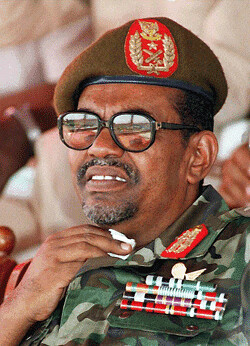
Sudan President Omar Hassan al-Bashir has gained the support from many African and Arab states in light of the International Criminal Court indictment against him. He has dismissed the charges as an imperialist plot to seize the oil wealth of Sudan., a photo by Pan-African News Wire File Photos on Flickr.
North Sudan takes control key town in Abyei
Ulf Laessing,
Reuters May 22, 2011, 6:38 am
KHARTOUM (Reuters) - North Sudanese army forces took control of the main town of the disputed Abyei region on Saturday after fighting with southern forces, both sides said, in further violence ahead of southern secession.
Southerners voted in January to become independent on July 9 in a referendum agreed under a 2005 peace deal, but violence has escalated in recent days in Abyei, the main outstanding dispute between the two sides in the run-up to secession.
"Enemy forces" had been expelled to the south, Khartoum-based Sudanese state television said in a news bulletin after fighting was reported throughout the day in Abyei, which has oil and fertile grazing land.
The United Nations said the northern army had deployed 15 tanks alone in one area in Abyei town, where gunshots could be heard until fighting appeared to subside for the night, spokeswoman U.N. Hua Jiang said.
Another U.N. official said the end of fighting before midnight indicated the north appeared to be in control of Abyei town though the official confirmation would have to wait until patrols could take a look.
In another telling sign, Sudan's President Omar Hassan al-Bashir removed the two heads of the Abyei administration and dissolved the region's administrative council, state news agency SUNA said. It gave no explanation.
The southern army acknowledged northern forces controlled the main town. "Abyei town is now under control of the SAF (Sudanese Armed Forces). They came with tanks," said SPLA spokesman Philip Aguer.
He said northern aircraft had also bombed from the air and shelled at least four villages, among them Todach and Tagalei, which he said had been already hit on Friday.
Abyei residents were also meant to have a referendum in January over whether to join the North or the South. Disputes over who could vote derailed that ballot and talks over the status of the region have stalled.
North and South have also yet to agree how to share oil revenues and other assets prior to the breakup.
ESCALATING VIOLENCE
The latest violence came a day before a U.N. Security Council delegation was due to hold talks with the Khartoum government over Abyei.
U.N. spokeswoman Jiang said she could not officially confirm northern forces were in control of Abyei town because U.N. staff could not go out because of the security situation.
But gunshots had been heard there in the evening and three mortars had landed inside a U.N. camp, though there were no casualties, she added.
Tensions escalated after the north accused the SPLA of attacking a convoy of Sudanese soldiers and U.N. peacekeepers in Dokura north of Abyei town late on Thursday.
The SPLA denied responsibility for the attack, which the United Nations said had taken place on a convoy of northern troops escorted by U.N. peacekeepers under a deal for both sides to withdraw forces from the disputed territory.
The North and South are supposed to have withdrawn all of their forces from Abyei by this week except for a special joint force made up of units from both sides.
The mainly Muslim North and the South, where most people are Christian or hold traditional beliefs, fought for decades in a civil war that killed an estimated 2 million people.
The war ended with a 2005 peace deal that led to the referendum on southern independence but the sides continue to clash over Abyei, which also contains fertile grazing land.
Earlier this month, at least 14 people were killed in clashes between northern and southern forces in Abyei. Both sides blamed each other for starting the violence.
Last month, Sudan's President Omar Hassan al-Bashir said he would not recognise the South's independence unless it gave up a claim on Abyei made in the south's draft constitution.
(Additional reporting by Khaled Abdelaziz; Reporting by Ulf Laessing; Editing by Jon Boyle)
No comments:
Post a Comment